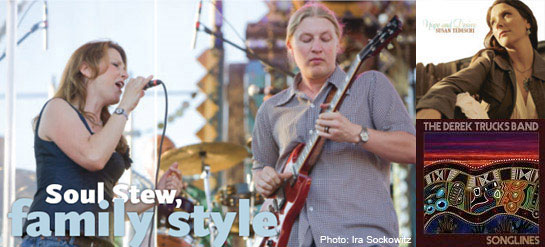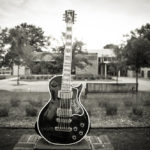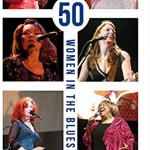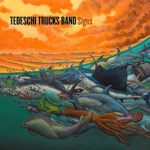
SUSAN TEDESCHI
Born in Boston on November 9, 1970, Susan Tedeschi started her singing career early. She appeared in a local gospel choir and theater productions before finishing kindergarten, sang with local bands by 13, and later enrolled at Berklee College of Music. Drawn to the blues, Susan played gigs around Boston, occasionally borrowing fellow singer Toni Lynn Washington’s backing band. Eventually she hit the road with the Susan Tedeschi Band and recorded her debut album, Better Days, in 1995. In 1998, her follow-up release, Just Won’t Burn, scored her a big break and a Grammy nomination for Best New Artist. Touring, she opened for B.B. King, and her next release, 2002’s Wait For Me, earned her two Grammy nods. Susan married Derek Trucks in 2001.
By the time Just Won’t Burn caught national attention, Susan had expanded her musical repertoire by being the sole guitarist onstage. She explained: “I used to have a lead guitarist in my band, and when he left, Buddy Guy said to me, ‘You don’t need to hire anybody to play guitar for you.'” Before long, she earned as much praise for her fiery slide work as her soulful singing.
In addition to Buddy, Susan has also shared stages with Dr. John, the Rolling Stones, Otis Clay and Bonnie Raitt, among others. Susan’s latest album, Hope and Desire, was released in 2005 and garnered her fourth Grammy nomination. On this, she left most of the guitar work to capable axe-man Doyle Bramhall II and focused her energy on her powerful vocals, covering Bob Dylan and Otis Redding, among others. Susan is currently on tour with Derek Trucks, taking their Soul Stew Revival across the country on the big-name festival circuit.
DEREK TRUCKS
Slide guitar virtuoso Derek Trucks was born June 8, 1979 in Jacksonville, Florida. The nephew of Allman Brothers co-founder and drummer Butch Trucks, Derek picked up his first guitar at nine and hit the road with local blues acts. By the time he turned 12, Derek, considered a child prodigy, was sharing stages with Buddy Guy and the Allman Brothers Band. Derek formed his own band in junior high school, and played with Joe Walsh, Stephen Stills and Bob Dylan. In 1999, Derek became an official member of the Allman Brothers Band, touring and contributing to a number of their releases.
The Derek Trucks Band, whose musicians share a love of musical exploration and improvisation, have for over ten years fused blues, rock, jazz and world music into a unique sound. Despite diverse ages and backgrounds, the core lineup’s longevity, tireless performing and camaraderie has created a unified musical vision. The band has released six albums, starting with their self-titled debut on Landslide Records in 1997. A new DTB album is in the works and scheduled for an early 2009 release.
Derek commands a wide array of slide guitar styles including blues, R&B, rock ‘n’ roll and jazz. With diverse influences from Elmore James and Duane Allman to John Coltrane, Charlie Parker and Sun Ra, he has collaborated with many legendary musicians, including Junior Wells, Willie Nelson, Béla Fleck & the Flecktones, J.J. Cale, Elvin Bishop, Santana and wife Susan Tedeschi, and joined Eric Clapton’s 2006/2007 world tour as a featured soloist. Derek, a songwriter and master of his craft, revitalizes roots music, preserving and reinventing the time-honored art form for future generations. He and Susan Tedeschi have two children, so that’s a start.
![]()
Elmore: What are you listening to right now?
Susan Tedeschi: I have three different repertoires right now, so I’ve been mostly listening to stuff I’m learning or playing. When I have free time, I usually listen to Derek’s stuff. When I venture out, I listen to Stevie Wonder, Donny Hathaway, old Aretha, Mahalia Jackson, Sly Stone, Derek & the Dominos—a lot of soul and rock-soul.
Derek Trucks: Mixes from our new record lately—making sure that it sounds OK, and a Charlie Ralph record, and Sly Stone.
EM: What was the first record you ever bought?
ST: Oh my gosh, it’s probably embarrassing, a musical soundtrack or something, I remember being little and buying “The Greatest Love of All” by Whitney, but actually I think the very first was a Cars record, Shake It Up, in eighth grade.
DT: It was a “best of the blues” compilation disc. I knew about B.B. King which is why I bought it, but it was Howlin’ Wolf and Bobby Bland and a bunch of other artists that I wasn’t familiar with at the time. I was maybe nine or ten. That compilation turned me on to a lot of artists that I ended up falling in love with later.
EM: Where do you buy your music?
ST: I buy a lot of it online, honestly, or if I’m in a town I try to go to the Mom & Pop stores. Especially since nowadays there aren’t even many big chains left. My husband turned me on to a lot of world music, I listen to U. Shrinivas, an Indian classical mandolin player, he’s really amazing, so I look for records like that at major stores where they have a nice big music collection. I find Nigerian funk or Florida funk or different types of music where you can find some cool bass lines or cool grooves, and you can apply it to the music you play and learn from it. I’m just trying to get different angles on different styles of music to help increase my knowledge as much as I can.
DT: We hit a lot of record stores on the road and try to hit independent stores if we can. There’s a few great ones left—they’re dropping like flies these days, though. Occasionally we’ll end up in one of the major chains. We just got Internet on the bus, so we’ll iTunes a track we’re jonesing for. I’ve been buying up a lot of old vinyl lately, too. I don’t have the good turntable yet, but I plan on it. It really does sound so much better; it’s relaxing to hear an LP after hearing digital music.
EM: What was the first instrument you played?
ST: Clarinet and piano: played clarinet for seven years, played piano growing up. I started playing guitar at 14, electric guitar at 21, and have been doing that ever since.
DT: Guitar. I got a guitar at a garage sale at nine years old and started messing around with that. I had a cousin that played clarinet early on so I think I might have picked that up and messed around with it a little but it was guitar at first.
EM: What brought you to the instrument you now play?
ST: My dad played acoustic guitar and harmonica so I always thought it was really cool. I always wanted to be able to play guitar and sing. In my early 20s, I started really discovering a lot of amazing Chicago blues guys, Magic Sam, Buddy Guy, Otis Rush, and Freddie King and Albert King and B.B. King, guys that played guitar and sang. That’s really what changed it for me, it made me really want to go out and learn how to play guitar while I sang. It was a huge inspiration for me at the time and it still is. All of those guys are really big influences on me.
DT: I was on the road maybe three or four months after I started playing, sitting in with this blues band out of Jacksonville, but it wasn’t until I was 13 or 14 that I really got serious. I had a band and we were traveling but it was just something that was fun, I didn’t think about it very much. At that age if something feels good and it comes to you naturally, you just kind of go with it, but it wasn’t until 13 or 14, after being on the road for a few years, that I decided if you’re gonna do it, you got to be serious and dig in.
EM: Who would you like to write with that you haven’t?
ST: Stevie Wonder. He’s amazing. Bob Dylan is a huge favorite songwriter of mine, so that would be a dream. B.B. King—that would be fun, to write with some of the blues guys. I never really wrote with people until recently. I’ve been enjoying it, so I guess I’d have to look into it more.
DT: Wow, there’s a ton of people out there I’d love to get together with and see what happens. It would be fun to collaborate with someone like Ray LaMontagne. We just built a studio behind our house and been having friends come in. We just had Doyle Bramhall in and we wrote a bunch of tunes together. With some people it just really clicks, and with him we were just spitting out tunes left and right, and we’re pretty happy with the way they all turned out. That’s been a new world for me, I’ve never really written tunes with other people, or never been in a situation with enough time to sit down and really write, so it’s exciting to dig into it more.
EM: What musician influenced you most?
ST: Maybe Aretha Franklin, who changed my style from when I was in my teens, singing country and folk, to singing soul music and R&B, and then blues. Later, I was getting compared to Bonnie [Raitt] and I didn’t know who she was; then when I really got into her, I was like, “Wow!” I loved her. Her and Aretha I’d say, for women. But definitely Ray Charles, Otis Redding, artists like that, and there’s a lot of them.
DT: Duane Allman was the first and biggest influence. The sound of his guitar on Fillmore East and the Derek & the Dominos record really got me interested. After him, Elmore James, and then later on, horn players like Wayne Shorter and John Coltrane, John Gilmore.
EM: What was the song or event that made you realize you wanted to be in music?
ST: I was onstage at six so probably Annie or Judy Garland—”Somewhere over the Rainbow.” That was my earliest remembrance of really knowing at a young age that I wanted to be onstage singing.
DT: There was always music around the house. My mom was a huge Joni Mitchell fan and my parents had a great vinyl collection, there was always great music spinning, whether old blues or all the old Allman Brothers albums, and I knew my uncle was in the band, though I wasn’t around the group at all. I started playing and sitting in with local blues bands and then was on the road at nine, ten years old. I don’t know if there was one moment that set me in that direction—I was already well into it by the time I had that moment.
EM: Who would you like in your rock ‘n’ roll heaven band?
ST: Let’s see…keyboard, Billy Preston. Bass, James Jamerson. Drums, Al Jackson. Guitar, Freddie Stone from Sly & the Family Stone and Jimi Hendrix, and John Coltrane on tenor. We could have quite a lineup. Get Clifford Brown on trumpet, Wyclef on trombone, that would be it, pretty much. That would be fun, just awesome.
DT: I would try to throw some people in there, you have to make sure they get along. It depends how long you plan on keeping the band together. I’d probably have to have two bands. I’d have to have one that was more jazz-influenced; I’d put Elvin Jones on drums. The Allman Brothers’ rhythm section is pretty damn strong for the rock group, or John Bonham would be fun to play with. On bass in the jazz group, Cachao or Paul Chambers, and on the rock side maybe we’d throw Jaco in. Guitar players? I guess I’d put Duane in there, that’d be fun. Duane and Charlie Christian, two guitar players. Maybe 1970 Stevie Wonder on keyboards and vocals, to see what happens. We’d have to throw in a bunch of horn players: Cannonball Adderley, Wayne Shorter, John Gilmour, the whole Sun Ra Orchestra. Unlimited payroll I assume.
EM: What’s your desert island CD?
ST: Goodness, that’s really hard. I used to pick Mahalia Jackson’s Queen of Gospel record, but I picked that a lot. I used to pick Chicago Bound by Jimmy Rogers, but now maybe Donny Hathaway Live, I never get sick of Donny—or maybe The Genius of Ray Charles box set.
DT: Ali Akbar Khan, who’s an Indian classical sarod master, still alive, there’s a great record he did in the mid-’60s, released as Signature Series Vol. 2. Whenever I’m completely at a loss for where to go, what to do, I put that record on and it’s kind of a slate cleaner. Ali Akbar Khan, Signature Series Vol. 2 would be the one.






[…] talking about Tedeschi Trucks Band. When Derek Trucks was a teenager two decades ago, guitar heads were falling all over themselves raving that he was […]